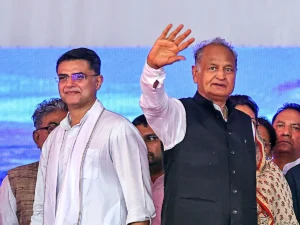The vibrant political landscape of Rajasthan is once again buzzing with enthusiasm as the state gears up for the crucial 2023 assembly elections. These elections hold immense significance, not just for the state but also at the national level. In this comprehensive analysis, we will delve into the backdrop of the Rajasthan elections, explore the current political climate, and scrutinize the recent development that has sent shockwaves through the Congress party.
Backdrop of Rajasthan Elections
The Rajasthan assembly elections, scheduled for November 25, are poised to shape the political destiny of the state for the next five years. As the political parties’ lock horns, the primary players in this electoral battle include the Indian National Congress, Bharatiya Janata Party (BJP), and other regional parties.
Key Players in Rajasthan Politics
- Indian National Congress (INC): The grand old party, Congress, has historically been a dominant force in Rajasthan. Led by Chief Minister Ashok Gehlot, the party has been striving to maintain its stronghold in the state.
- Bharatiya Janata Party (BJP): The BJP, the principal opposition party, has been relentless in its efforts to reclaim power in Rajasthan. With a charismatic leadership and a slew of strategic moves, the party is leaving no stone unturned.

Congress Suffers a Blow
Former Minister Joins Saffron Party: In a shocking turn of events, the Congress party in Rajasthan has been dealt a severe blow as Former MLA Asoka Tanwar, a prominent leader and a seasoned politician, decided to switch allegiance to the Saffron party. This unexpected move has sent ripples through the political spectrum and has raised several questions about the stability and unity within the Congress ranks.
Saffron Party: A Historical Perspective
The Saffron party, commonly known as the BJP, has a rich history rooted in the Rashtriya Swayamsevak Sangh (RSS) ideology. The party has gradually evolved into a formidable political force on the national stage. The term “Saffron” is emblematic of the party’s commitment to Hindutva and nationalist principles.
Reasons Behind the Switch
The sudden shift of Former Minister from the Congress to the Saffron party has left political pundits speculating about the underlying motives. Possible reasons range from ideological differences, personal ambitions, dissatisfaction with the Congress leadership, to promises of a more prominent role within the BJP.
Impact on Congress
The departure of a key figure is undoubtedly a setback for the Congress party. It not only reflects internal disarray but also raises questions about the party’s ability to retain its leaders. The loss may dent the party’s image and affect its prospects in the upcoming elections.
Positive and Negative Consequences:
On the positive side, the Saffron party gains an experienced leader with a proven track record. This could bolster the BJP’s campaign strategy and appeal to a broader voter base. However, the negative consequences for the Congress are apparent — internal strife, potential erosion of voter confidence, and the challenge of filling the leadership vacuum left.

BJP’s Targeting of Ashok Gehlot
Adding to the Congress’s woes is the BJP’s strategic targeting of Chief Minister Ashok Gehlot over the recent Dausa rape incident. The incident has become a focal point in the electoral discourse, with the BJP accusing Gehlot’s administration of failing to ensure law and order in the state.
The Dausa Rape Incident
The Dausa rape incident involves a minor girl was allegedly raped by a police sub-inspector in Rajasthan’s Dausa district, said police, adding that the accused has been identified as Bhupendra. Dausa SP Vandita Rana informed that the estimated age of the victim is around four to five years. The BJP has seized upon this unfortunate event, using it as a potent weapon to question the efficacy of Gehlot’s governance. The incident has sparked public outrage and intensified the political tussle between the two major parties.
Impact on Elections 2023 and Rajasthan’s Condition
The Dausa rape incident has altered the dynamics of the upcoming elections. The electorate’s perception of the Congress government’s ability to maintain law and order is now a crucial factor. The BJP’s relentless targeting of Gehlot on this front could influence voter sentiment and impact the electoral outcome.
Rajasthan’s Current Status
Beyond the political theatrics, the state of Rajasthan is grappling with various challenges, including economic issues, unemployment, and the aftermath of the COVID-19 pandemic. The outcome of the 2023 elections will inevitably shape the trajectory of Rajasthan’s development and governance in the coming years.

Conclusion
As the countdown to the Rajasthan assembly elections continues, the political landscape is evolving with every passing day. The Congress party’s internal rifts and the BJP’s strategic moves have added layers of complexity to the electoral narrative.
The defection of Ashok Tanwar and the BJP’s targeting of Ashok Gehlot underscore the high-stakes nature of these elections. The voters, caught in the crossfire of political maneuvering, will play a pivotal role in determining the state’s future.
The road to victory for any party will require navigating the intricate web of political dynamics, public sentiment, and the pressing issues facing Rajasthan.











